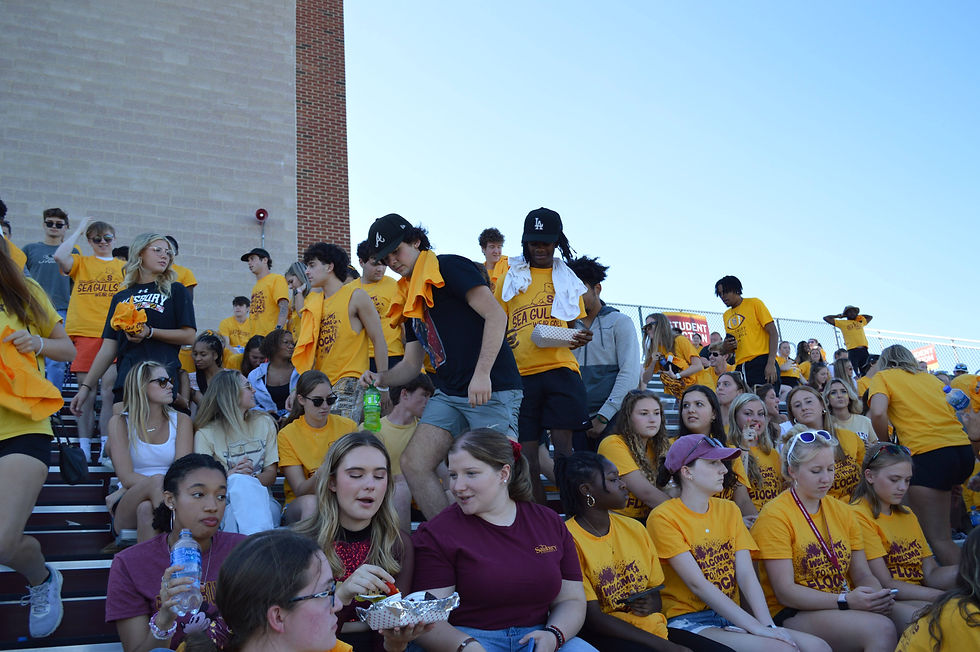SU anti-Semitism panel urges community to embrace diversity
- Nov 9, 2018
- 4 min read
Updated: Jan 16, 2019
The mass murder of 11 members of the Jewish community in Pittsburgh is being called the “deadliest assault on Jews in U.S. history.”
Given the current violent happenings in the U.S. revolving around anti-Semitism, Salisbury University hosted a panel discussion to shed light on the past, present and future of the issue in our world.
Multiple scholars from different educational backgrounds looked at the topic of anti-Semitism from the unique perspectives of the humanities, history, politics, education and communication.
Speakers emphasized that their task of summarizing events was difficult in that they were working to compile information from over a thousand years into the time constraints of the panel.
Dean of the Fulton School of Liberal Arts Maarten L. Pereboom highlighted the historical timeline of anti-Semitism and revealed that stereotypes and discriminatory views are “sort of culturally embedded in parts of the world where the groups being discriminated against don’t even live.”
Professor of philosophy at SU Dr. Timothy Stock analyzed the violence toward Jews from a humanities perspective and discussed the advice of the well-known philosopher Moses Mendelssohn to educate oneself before judging on what you do not understand.
Stock stated that reading texts from others is the first step in facing our differences and educating ourselves.
Stock invited members of the audience to join him following the formal discussion in reading the text Genesis 12 1-6 to take action on this belief.
“One of the ways that you can create unity is to have a meal with a person,” Stock said. “You can marry a person, and experience their family and experience a culture that you weren’t born in. And you can experience a common world in the sense of having shared events.”
As a transition to anti-Semitism and violence in today’s world, Associate Professor of Communication Arts Dr. Jennifer Cox discussed social media’s impacts in both positive and negative aspects.
Social media played a significant role in the most current synagogue shooting in that the shooter used the social media platform Gab, which is an extremist-friendly site that does not censor violent content.
The shooter posted hate messages toward the Jewish community preceding the shooting and foreshadowed his plan to take violent action toward Jewish people.
Cox explained that many people like to blame social media for the amplification of hate messages and she states that “They are not wrong to do so.”
“The thing that’s striking about social media is that it takes freedoms of speech and the First Amendment, and it pushes it to the limits that are hard for a lot of Americans to spell,” Cox said.
Following the speeches from the panelists, attendees of the event were invited to partake in small group discussions with the scholars of their choice to ask questions and join in on the conversation of anti-Semitism.
Associate Professor of Theatre and Costume Design at SU Leslie Yarmo joined in a group discussion with members of the community and Pereboom.
“I think that so often, I know growing up as a Jewish person, that the history of anti-Semitism used to always be that there were these big events,” Yarmo said. “But I think that very few people really understand how anti-Semitism was part of daily life for thousands of years.”
Shedding light on the smaller events, Yarmo discussed various anti-Semitic practices such as the badges Jews were forced to wear for 600 years and the races in which Jews were forced to race naked at gunpoint.
Sophomore Aida Dodoo attended the forum primarily out of mourning. Dodoo attended the synagogue vigil on Friday and the vigil on campus Sunday — but she felt it was her civic duty to do more.
“I feel like as humans in general, it’s just our duty to help others, and I think all of us, like every person on this campus, has been slacking a little just in the grand scheme of things,” Dodoo said. “I’m trying to make myself a better person and be out there to help others.”
The small group with Pereboom, Yarmo, Salisbury resident Jim Donohoe and former Director of the Center for International Education at Nazareth College George Eisen conferred over the various ways to combat the overall issue of anti-Semitism and people’s tendency to resort to violent tactics.
All members of the discussion cohesively agreed that the main ways to change these culturally embedded tendencies are through education, travel and overcoming the habit of fearing differences.
Junior Lucas Burtnick attended the event because he believes it’s important to educate the public to avoid future violence.
“I think anti-Semitism is a really endemic issue that has resurfaced quite visibly in the past few years, and just the massacre last Saturday was a huge, awful example of that,” Burtnick said. “I think it’s important that we all discuss the rhetoric that leads these kinds of things, so we can work to prevent them from happening.”
Pereboom discussed that throughout history, there is something inherently human to fear those who are different from ourselves, and this fear ultimately results in violence.
“We have the capacity to educate ourselves, and we live in a big, diverse society with lots of people who are very different from one another, so we have to learn better ways,” Pereboom said. “Even if our human nature might incline us toward certain bad behaviors, we need to learn.”
By CAROLINE STREETT
Gull Life editor
Featured photo: Associate Professor of Communication Arts Dr. Jennifer Cox works to educate the public on the positives and negatives of social media in relation to the amplification of hate messages and anti-Semitism (Brendan Link image).





Comments